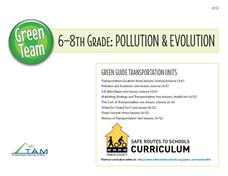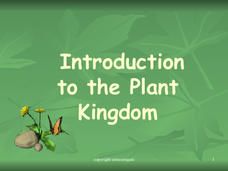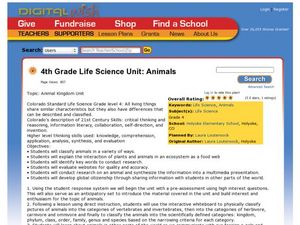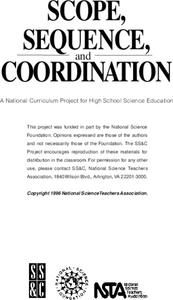Scholastic
Study Jams! The Kingdoms of Life
Life science learners discuss the characteristics of five kingdoms of life: animals, plants, fungi, protists, and bacteria in this video. Viewers find out from the dialogue that scientists group organisms according to similarities. This...
Biology Junction
Kingdom: Fungi
Based on DNA, fungi relate more closely to animals than to plants. This new scientific knowledge shifted the world view of scientists and opened up new classifications. Viewers learn about fungi's place in evolution, in the tree of life,...
Scholastic
Study Jams! The Kingdoms of Life
Zoe and RJ discuss the way scientists classify organisms into five kingdoms. Characteristics of each group are highlighted within their conversation and with text. First-time taxonomists can view the animation at home, take the...
Safe Routes to School
Pollution & Evolution
Bring together a study of two major scientific topics with a instructional activity on the relationship between pollution and evolution. With the help of a PowerPoint presentation, hands-on activity. and class demonstration young...
Curated OER
Diversity of Modern Life
Convey classification to your amateur biologists with this bright and bold presentation. After you introduce each kingdom, query your viewers with the included reinforcement questions. Since there are no photos of the different...
Curated OER
Kingdom: Fungi
The general characteristics that affect classification of fungi and other organisms in the domain Eukarya are detailed for the students on 12 attractive slides. Teachers can access individual slides to cover life cycles or...
Curated OER
The Classification of the Kingdoms of Life
Students can learn about the evolution of science by discussing the classification of living things.
Biology Junction
Introduction to the Plant Kingdom
Plants provide humans with food, shelter, and medications. Scholars gain a better appreciation for plants after learning their functions, divisions, and early ancestors. Each sub-topic includes slides highlighting vocabulary and...
National Nanotechnology Infrastructure Network
Biology Reference Sheet
First year life science or biology pupils will appreciate this all-inclusive reference page. It provides a diagram of both a plant and an animal cell, the metric system prefixes, classification levels, definitions for cell processes, the...
Curated OER
Classification of Life
In this classification of life worksheet, students use an on line source to answer questions about how species are classified, named and grouped. They give the classification of a bear, an orchid and a sea cucumber.
Curated OER
Mosquito Life Cycles
Learners gather mosquito eggs to record the mosquito life cycle using drawings, descriptions, and any other appropriate means. In small groups, they analyze and describe the process of complete metamorphosis. They classify mosquitoes...
Curated OER
AP: Chapter 26: Origin of Life
Five pages take biologists on a generalized survey of the origin of life. Queries are made regarding theories of how life developed, ancient Earth conditions, and the ever-changing field of taxonomy. The experiments of different...
Curated OER
The Origin of Life
In this origin of life worksheet, students write answers to five questions. They describe characteristics of the first life forms and how scientists believe oxygen accumulated in the Earth's atmosphere.
Curated OER
4th Grade Life Science Unit: Animals
Fourth graders classify animals. In this animal kingdom lesson, 4th graders research animal habitats and behaviors. Students connect to a zoologist via SKYPE and learn about animal classification. Students blog about preserving animal...
Casimir Middle School
Biological Classification Worksheet
Classify living things with a set of worksheets that has pupils sorting and indentifying living and non-living things. Learners use the worksheets as a basis for finding their answers.
Curated OER
Living Things
Alive or not? After viewing this presentation, life science learners will know how to answer this question. They are introduced to the seven processes of living systems and the classification hierarchy. Because it only covers...
Curated OER
What a Fungi
Seventh graders perform an experiment to determine the best growing conditions for molds. In this life science lesson, 7th graders explain where molds are commonly found. They collect data and draw diagrams of their observations.
University of Hawaiʻi
Taxonomy and Me!
Taxonomy is the study of organisms and how you phylum. Three biology activities are included, helping scholars understand four of the six kingdoms, specifically Protista, Plantae, Fungi, and Animalia. Scholars observe and classify...
Curated OER
Classification Schemes
Junior biologists journey through the hiearchy of living things with these activites. Using a dichotomous key, they identify common algae, plants, and fish. They design their own key for a mixture of seeds and a collection of...
Curated OER
Plant Diversity
Here is an all-encompassing overview of the plant kingdom! In this worksheet, beginning botanists describe characteristics of the four different plant phyla, explain various life cycles, differentiate between monocots and dicots, and...
Virginia Department of Education
Cell Parts
What do a bird, an egg, a rabbit, and a toad all have in common? This fun-filled resource explains the similarities and differences between cells and how all cells are similar, yet all are different. Learners begin by depicting a...
Allegany-Limestone Central School
Plantae WebQuest
Send your young life scientists on a plant webquest that has them reading case studies to decide if seeds are seeds and plants are plants.
Curated OER
Life Cycles
In this life cycles worksheet, students compare the life cycles of 2 different species and answer short answer questions about them. Students can choose the species to compare and then answer 6 questions.
Curated OER
Discovering the Forgotten Kingdom Protista
Protists, like algae and mold, are sometimes overlooked for classroom study, but they are astonishing in their diversity and importance.























